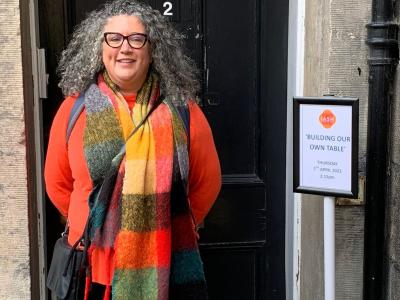
A guest blog by Dr Désha Osborne
The alternate title for this event, held on 7 April 2022 at IASH to recognise, celebrate, and BIG UP the work of Lisa Williams while turning a critical eye on our own archival practices, could have easily been called ‘History as the Work of Healing.’ I was joined in a roundtable discussion by three remarkable scholars: Nadine Chambers, a PhD candidate at Birkbeck, University of London; sociologist Katucha Bento, Lecturer in Race and Decolonial Studies and Associate Director of RACE.ED at the University of Edinburgh; and historian Shantel George, Lecturer at the University of Glasgow and member of the Beniba Centre for Slavery Studies. We four all work in areas of research that necessitate using the archives. We four are also professionally and personally acquainted with Lisa and realise how the quality of our work, our mindfulness and our understanding of care has grown in the years that we’ve known her. Williams is the founder and director of the Edinburgh Caribbean Association where she organises regular Black History Walking Tours through Edinburgh’s New and Old Towns. Over the years, she has helped to create and connect networks of educators in primary and secondary schools; artists, dramatists and writers; institutions, scholars and community activists all seeking to tell a revised and inclusive history of Scotland that acknowledges the wrongs done over the centuries to people of African descent while managing not to re-inflict trauma on their living descendants. Her work is rooted in her extensive knowledge of Edinburgh’s connection to the transatlantic slave trade and the lives of Black and mixed-heritage Scots from the 16th century to the present.
I asked each speaker to think about the idea of 'Black archival practice' and how has knowing Lisa affected their work. A question we considered is one put by Saidya Hartman in her article 'Venus in Two Acts': how does one revisit the scene of subjection without replicating the grammar of violence? In other words, what are the possibilities we encounter when attempting to tell impossible stories or working with absences in the Black archival presence (etc)? Nadine started out by talking about her archival work surrounding bauxite mines in Jamaica, and the related connections between Blackness and indigeneity in the fleshing out of stories from the archives. For her, the Black archival presence means finding what you are looking for even though you are not aware. Sharing her recent work with quilombos in Brazil, Katucha spoke about the need to rediscover, re-think, and rewrite new forms of knowledge that validates: ‘I am the Atlantic.’ Shantel’s work of healing involved bringing Orisha worship, called in Grenada African work, to the centre of Grenadian identity through a discussion of obeah as healing practice.
We all understood that in her tours, and her writing and her poetry, Lisa has found a way to speak into and through the mournful archival silences and absences mentioned by Nadine, Katucha and Shantel. This idea of history as the work of healing – indicating a very difficult and careful praxis – is found in a certain type of historical labour. This labour is not found in the struggle to be the first to say what happened but the struggle to do what might seem to be the impossible. How this praxis is scripted and performed for Black scholars was at the heart of our roundtable discussion. For Lisa, and so many Black and brown women of colour who engage with history, the difficulty has been with this delicate teasing, pulling, this extracting of selves (I mean bodies with their flesh intact) out of these grand narratives of men, money and its movements. Lisa teaches us that healing needs to become a form of critique – her engagement with history as the work of healing has become a rubric – a way to create and test spaces that tell the story of Black peoples in this country with dignity. Any person who has been on the Black History Walking Tour can hear, see and feel it.
Lisa did years of heritage work in the Grenadines (part of the island chain where my heritage and research into Scotland and slavery begins) and Grenada, and I think that has prepared her for this position as historian and educator. By applying that rubric, she teaches all of us what it means to grapple with language, with the idea of lifelong learning as method and as far as the archive goes – knowing where and when to stop. The search for a new vocabulary requires moving away from trauma as the groundwork of the Black experience. The work of Black archival practices is often spoke of using African American historian John Hope Franklin’s metaphor of weaving the Black presence ‘into the fabric of American history.’ So, instead of weaving, I think a different historiographical metaphor that encapsulates my experience with Lisa as colleague and friend – and the inspiration for this event. Her work has shown all of us that to tell the stories we want to tell we need to build our own tables. Other people’s tables won’t do. This means not waiting for a space at someone else’s table, nor does it mean fighting others in your same predicament for a place at a table with only room for one of you. Building our own tables mean selecting and creating the material in which to construct your stories. Building our own tables also means being prepared for hostility. It means being prepared to speak when we have been used to being silenced – and being ready to hear the sound of our own voices.
A full recording of the event can be found on our YouTube channel, or viewed below.
